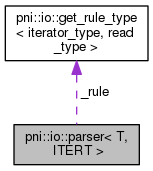parser for primitive types More...
#include <parser.hpp>
Collaboration diagram for pni::io::parser< T, ITERT >:

Public Types | |
| typedef ITERT | iterator_type |
| iterator type More... | |
| typedef T | result_type |
| result type of the parsing process More... | |
| typedef boost::spirit::qi::expectation_failure < iterator_type > | expectation_error |
| parser exception type More... | |
Public Member Functions | |
| result_type | operator() (const pni::core::string &data) const |
| parser primitive type More... | |
Private Types | |
| typedef conversion_trait < result_type > | trait_type |
| conversion trait type More... | |
| typedef trait_type::read_type | read_type |
| type used for reading the data More... | |
Private Attributes | |
| get_rule_type< iterator_type, read_type >::type | _rule |
| rule which will be used to read the data More... | |
Detailed Description
template<typename T, typename ITERT = pni::core::string::const_iterator>
class pni::io::parser< T, ITERT >
This version of the parser structure provides a default parsing implementation for primitive types. The aim of this class is to hide all the complexity of the boost::spirit::qi parsers. In addition it catches all spirit exceptions and wraps them into a parser_error exception.
Use this parser to parse a single primitive value from a string. The input data must be trimmed - so no leading or trailing blanks are allowed. The string is supposed to end with the last character assembling the value to parse.
By default the output iterator is a const string iterator.
- Template Parameters
-
T primitive data type ITERT iterator type
Member Typedef Documentation
template<typename T, typename ITERT = pni::core::string::const_iterator>
| typedef boost::spirit::qi::expectation_failure<iterator_type> pni::io::parser< T, ITERT >::expectation_error |
template<typename T, typename ITERT = pni::core::string::const_iterator>
| typedef ITERT pni::io::parser< T, ITERT >::iterator_type |
template<typename T, typename ITERT = pni::core::string::const_iterator>
|
private |
template<typename T, typename ITERT = pni::core::string::const_iterator>
| typedef T pni::io::parser< T, ITERT >::result_type |
template<typename T, typename ITERT = pni::core::string::const_iterator>
|
private |
Member Function Documentation
template<typename T, typename ITERT = pni::core::string::const_iterator>
|
inline |
Parses the input string and returns an instance of a primitive type. In case of errors parser_error is thrown.
- Exceptions
-
parser_error in case of any problems
- Parameters
-
data the string with input data
- Returns
- instance of the primitive type
Field Documentation
template<typename T, typename ITERT = pni::core::string::const_iterator>
|
private |
The documentation for this class was generated from the following file:
 1.8.8
1.8.8